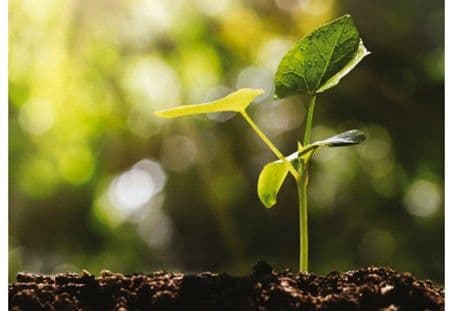RECYCLING INERT SOILS AND GREEN WASTE TO CREATE FERTILE SOIL
As part of its look at the urban metabolism, Plaine Commune is piloting a new call for proposals. It’s entitled « Let’s work together to build new avenues for the re-use of materials from the construction & public works sector« .
For ECT, the objective of producing a fertile substrate has two recycling components: Recycling inert soil from the sites of the construction & public works sector, and recycling composted green waste. This mixture makes it possible to create technosols rapidly.
CONSERVE TOPSOIL, STOP IMPORTS
Topsoil is a natural resource that needs to be conserved. It’s important to limit imports of topsoil into cities as far as possible. ECT’s fertile substrate represents a 100% eco-friendly alternative:
- Produced near where it’s going to be used, it reduces the carbon footprint of both urban green space developments and restoring farmland;
- The product of twin avenues of recycling, the fertile substrate is a successful illustration of the ‘circular economy’.
INCREASE NATURE IN THE CITY WITH AN EFFECTIVE AND ECONOMIC SOLUTION
Developing nature in the city means limiting or even reversing the artificialisation of soils. This makes it possible to boost biodiversity and provide residents with spaces for relaxation and leisure.
Less expensive than topsoil, ECT’s fertile substrate makes it possible to develop more green spaces, adding to well-being in town.
RECONSTRUCT THE SOIL AND ‘GREEN’ THE CITY MORE EFFECTIVELY
When you create a technosol, you can vary the characteristics of the soil depending on its intended purpose: Vegetation, biodiversity, drainage and/or loadbearing capacity.
With a fertile substrate, it’s possible to modify the circulation or retention of water and minerals. It is also possible to achieve better stability and greater loadbearing capacity.
A DOUBLE EXPERTISE AND HIGH PRODUCTION CAPACITY
The leader in France in the re-use of inert soil, ECT has unrivalled expertise in the management and classification of soils. This expertise includes producing fertile substrates. ECT also has a subsidiary called BIODEPE, a business that specialises in organic waste and the fertilisation of soils. BIODEPE manages the local supply of compost made from green waste, and the production of a fertile mix.
Processing 15 million tons of excavated soil per year, ECT is able to meet all the supply needs of its customers. That’s why we can also provide a substantial outlet for the green waste pathway in the Île-de-France region.
CHECKING THE QUALITY AND TRACEABILITY OF ECT’S FERTILE SUBSTRATE
ECT checks the materials that go to make up its fertile substrate. Standards for analysis and traceability apply to both the inert soil and the green waste – unlike topsoil, which has no guarantee of analysis or traceability.
- The waste codes for inert soil: 17 05 04 / 20 02 02
- The waste codes for green waste: 20 02 01
ECT’S FERTILE SUBSTRATE IS RECOMMENDED FOR GRASSLAND SOILS, TREE WELLS AND GROWING CONTAINERS
- French standard NF U 44-551
- ECT’s centre of production is at La Courneuve (93), with roll-out planned for other ECT sites
- It can also be produced in situ where it will be used
- Available in ‘big bags’ or in bulk
- Competitive prices

